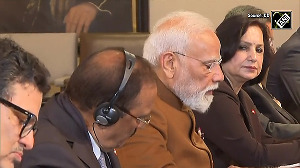One woman president or one woman chief minister does not make or prove the point that women are treated equally, but 33 per cent women in elected bodies does constitute a critical mass to make a difference, writes Additional Solicitor General of India Indira Jaising.
The history-making significance of the 108th Constitution Amendment Bill making reservations for women in Parliament and state legislatures, must be understood in the context of the status of women worldwide.
As an elected member of the Committee for the Elimination of All Forms of Discrimination Against Women of the United Nations, I see reports about the status of women worldwide.
One of the issues that all countries of the world have to mandatorily report on is the representation of women in parliamentary bodies. The participation of women in public life is seen as an indicator of equal rights, and hence low representation is a sign that women are less equal than men in all walks of life.
Naturally, I expected women to be represented in large numbers in developed countries.
It came as a shock to me that in most developed countries, including Germany and the Netherlands, women constitute not more than 5 per cent of elected representatives in parliamentary bodies.
I also learnt that women do not receive equal pay for equal work in these countries.
Indeed, while reporting on the Netherlands, the minister said that women 'choose' home-based part-time work as part of their right to choose to stay home with their children!
On the other hand, Rwanda, which had emerged out of genocide and would be expected to be backward by all economic parameters, had 58 per cent women as elected representatives in parliament.
This was thanks to the provision in their constitution for reservation for women. It was then that I realised that there was no relationship between development and gender justice and that development does not necessarily lead to equality for women.
In the South Asian Association for Regional Cooperation region, reservations for women in elected bodies have been an accepted strategy. Pakistan has seats reserved for women leading to 22 per cent women in parliament. Nepal alone has 33 per cent, as a consequence of its current constitution marked process and its electoral laws, which mandate that 50 per cent of all party candidates are women. This was possible in an emerging democracy, which could set its own standards of inner party democracy but has not been possible in India, where political parties are not subject to any constitutional discipline to enforce Fundamental Rights.
At the same time, one can anticipate an increase of violence against women seeking public office, as violence has always been a tool of excluding from privilege. Such is the power of reservation for women in elected bodies, that it can fast-track the right of equality and reverse the relationship between development and gender justice.
It is a little known fact that the reservation for women in the panchayats was challenged in the Supreme Court of India, but the challenge was ultimately withdrawn. It would not surprise me if this amendment too were challenged in the Supreme Court.
Challenging reservations in employment has become fair game and fashionable. The Mandal Commission and all reservations have got a dirty name. The objections are based on the notion that only the meritorious should get jobs or access to educational institutions or seats in Parliament any other public policy of affirmative action would be anti-democratic.
Their notions have been inherited from Western societies, which as pointed out earlier are built on privilege and perpetuate privilege through the gateway of 'merit'. And yet these societies have been forced to reckon with the demands for gender justice.
Norway has a law in place mandating 40 per cent reservation for women in boards of the corporate sector and several other countries are on the way to passing similar laws.
Critics there too argued that they would have to appoint 'escort girls' to the board, as men here argue that women in panchayats would have pati-panchs deputing for them as an argument against reservations. These and many others are self-serving arguments, intended to preserve privilege.
The argument in favour of 'merit' alone has been exposed as perpetuating the status quo and privilege, in politics as in education and business. One only has to look at the number of sons and daughters of politicians who have inherited their fathers' political career to understand that the system is not based on merit but on the accident of birth.
It is in this context that the public policy of reservations as a measure to advance equality has to be judged.
Today, we have more than a million elected women in panchayats. With the proposal in the recent budget to transfer funds to panchayats, we can hope to see genuine decentralisation and more power in the hands of these elected women. Tomorrow we will see the power of women in Parliament.
We have finally woken up to the realisation that the demands of equal representation for women cannot be denied for another century or more. An equal society means a society in which men and women have equal opportunity in all walks of life, including political representation.
Laws are made and unmade in parliaments and it is there that our voices must be heard. It is this that the Bill seeks to achieve. I see it as a first step to a revolutionary change.
Hopefully, it will bring women out of cloistered homes where they are brought up to believe their destiny is marriage and to bear children. No doubt, all corresponding mindsets in government will also have to change.
I hope we will no longer see official advertisements which say that we need to care for our women because they are the mothers of our future sons. Or that we will no longer see advertisements by public sector banks urging parents to save money for their daughters marriage, thereby meaning dowry.
We have lived for too long with comfortably with contradictory policies in our public life. The time has arrived for us cleanse our public spaces of male domination and make women visible. One women president or one woman chief minister does not make or prove the point that women are treated equally, but 33 per cent women in elected bodies do constitute a critical mass to make a difference.
We have a rich history of working with reservations as an instrument of public policy for Scheduled Castes and Scheduled Tribes. Their development has been fast-tracked from deprivation to participation in the mainstream of public life leading to economic enlistment in less than 60 years, a process that could have otherwise taken centuries.
It has been a mystery to me why this strategy used so successfully was never applied to women all these years. The answer could only be that Scheduled Castes and Tribes had their political leaders to articulate their demands successfully, whereas women did not constitute a political group as women. All that is set to change with this amendment to the Constitution.
More inclusive representation will lead to better governance. It is not as if by magic, women will be empowered overnight but certainly issues relevant to the human development index such as female maternal mortality and illiteracy will get the importance they deserve in national policy making.
Our elected bodies are not the only ones that are male-dominated. Look at the courts and the higher judiciary. There is not a single woman judge in the Supreme Court, and high courts only have 52 women judges out of a total of 630. Is it not time to have a quota for women in the judiciary?
A woman litigant facing sexual harassment at work once told me that she wanted her case to be heard by a woman judge in the Supreme Court. I told her this was not possible as there were no woman judges. Her next question was, how come the Supreme Court wants complaints committees to be headed by women but does not apply the same logic to itself? I had no answer to her question.
It is time for us to demonstrate that our actions are in tune with our commitments made in the Constitution. Non-discrimination based on sex is the promise of the Constitution and this Bill sets out to retrieve this promise. It is the single most important legislation, which uses sex as the criterion for affirmative action, whereas thus far the criteria of backwardness, Scheduled Castes and Tribes have been used.
In that too, it sets a trend in public policy.
One can expect to see more public policy based on positive discrimination based on sex. The private sector will be next in line for such policy-making. The example of Norway has already been mentioned where the law mandates appointment of women to the board of directors of corporations. This makes the point that whereas woman may have succeeded in gaining access to the lower rungs of the employment sector, such employment has been sex-segregated into jobs considered appropriate for women, such as social secretaries.
It is amazing that the case relating to appointment of women as supervisors in Air India is still being debated with men claiming that they cannot be, as the job of supervisor is a male preserve.
It is worth recalling that the Supreme Court not more than 25 years ago also held the same view and denied to women air hostesses the right to equality in employment. One wonders what the court will do when faced with a challenge to this constitutional amendment, as it will be, judging from the threats by the OBC leaders even before the Bill is passed.
What one can say with certainty is that this is surely the most significant Women's Day for women, with the Bill being introduced in the Raja Sabha. It is necessary to say a few words about the wisdom of introducing a Bill in the Raja Sabha rather than in the Lok Sabha.
A Bill introduced in the Rahja Sabha does not lapse when the government goes out of power for any reason, including the completion of its term, whereas a Bill pending in the Lok Sabha does lapse.
All future governments will be bound to take a call on the Bill, whether they like it or not, and will be judged by their commitment to gender justice or lack of it. The present amendment is surely revolutionary.
The sheer numbers of women to be seen in Parliament in the very near future will form a critical mass, never before seen in any country in the world save a few which have chosen the path of reservation for women.
Is it enough though to have reservations only in Parliament? Look at the Supreme Court, not a single woman on the bench! \
Such is the male nature of our most powerful institutions. This could be perpetuated for another century and only a measure like reservations can help women leapfrog into the future.





